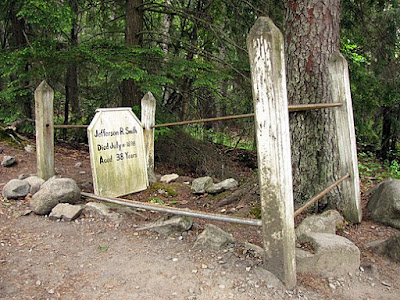Soapy Smith. What a perfect name for a con man. Smith’s best known con was to set up a table on a busy street corner in boomtown Denver. He wrapped money around bars of soap, wrapped paper around the soap and the money, then mixed up the bars and sold them for a dollar each. He made sure only his buddies got the bars with the money.
Jefferson Smith was born in 1860 into a wealthy family in Georgia. The family's fortunes declined as a result of the Civil War and the family moved to Texas. Smith's mother died when he was 17 and he left home to begin his career as a con man. He gathered a gang of like minded operators and separated victims from their cash with shell games, three-card monte and rigged poker games.
Smith shared his profits with the police and politicians at City Hall which allowed business to flourish. He soon opened a gambling saloon with a sign over the entrance which read, "caveat emptor" (buyer beware). Fortunately for Smith, his patrons did not speak Latin.
Smith had underworld rivals and there were several attempts on his life, but Soapy always shot first. Things got so bad, the citizens of Denver brought in anti-gambling reforms and Smith moved to the silver mining boomtown of Creede southwest of Denver. He used Denver based prostitutes to convince property owners in Creede to sign over leases to him and soon he was king of the Creede underworld. Smith wasn't all bad. He ejected troublemakers more violent than himself from town. He built churches, gave money to the poor, and paid for the burial of unfortunate prostitutes.
The reforms in Denver didn't last long and Smith returned there just before a huge fire destroyed much of Creede. Smith's luck always seemed to be in. Finally, a reform-minded governor decided to clean up Denver. When the governor tried to remove several corrupt city officials, Smith and his armed gang barricaded themselves in city hall to defend the officials. The governor sent in the militia then thought better of it and got the state Supreme Court to rule in his favor.
The final straw for Smith was being charged for the attempted murder of a saloon manager. To avoid the heat Smith took his business to Skagway, Alaska where there was plenty of gold lying around. Smith put the local sheriff on the payroll and set up a fake telegraph office even though telegraph wires did not reach the town for another two years.
Things came to a head when Smith bilked a miner out of a sack of gold worth $85,000 in today's money. The Skagway Vigilance Committee demanded that Smith return the gold. On this day in 1898 Smith went to the Juneau Wharf where the committee was holding a meeting and confronted a guard. A gunfight broke out and both Smith and the guard were killed. Smith was 37.
 |
| Caveat emptor |
Ad hominum, persona non grata, quid pro quo, habeas corpus, ad majorem dei gloriam.
ReplyDeleteMagna scriptura; mirum habeo volutpat!
Muchibus thankibus
ReplyDeleteDidn't this guy's grandson get into the con man act too? No, wait -- that was S-o-u-p-y Sales, not Soapy Sales. My mistake!
ReplyDelete